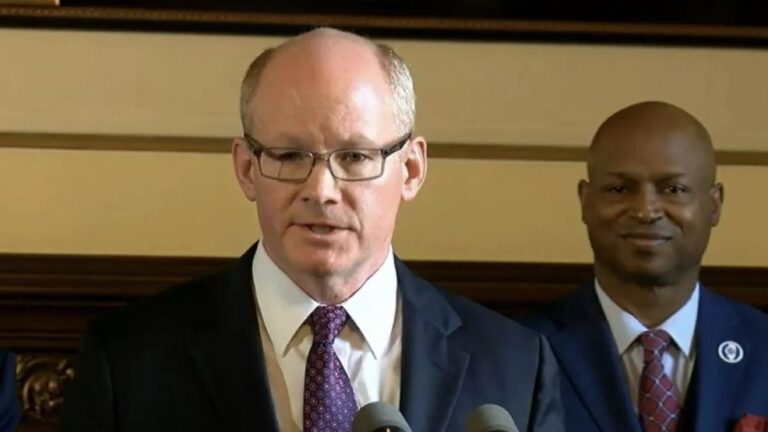A day after Gov. J.B. Pritzker and Democratic lawmakers announced a budget agreement, a revised version of the state spending plan moved a bit further along, passing the Illinois Senate late Thursday.
But completion of a final map of the districts of Chicago’s new elected school board could be pushed even further into the future, as the House voted to give themselves months more time to draw it up.
The plodding along on the state budget could still see the Illinois House passing the $50.6 billion spending plan by Friday — nearly a week later than the original deadline Democrats set for themselves.
At about 11:15 p.m., the Senate passed the budget by a vote of 34-22, paving the way for a House vote on Friday.
About an hour earlier the Senate passed one of the underlying budget bills, 36-20.
After its passage, Pritzker said he looked forward to the House taking up a budget “that will make childcare and education more accessible, healthcare more affordable, and our state’s business and economic position even stronger.”
“This budget makes transformative investments in the children and families of Illinois while building on our record of fiscal responsibility,” Pritzker said in a statement.
Senate Republicans, who were part of the budget negotiations, did not support the budget, in part because it included only a $2.50 wage increase for providers for developmentally disabled individuals. Two Democrats also voted no.
The Illinois Association of Rehabilitation Facilities had sought a $4-an-hour wage increase for the workers. Republicans were also miffed that funds for a private school scholarship program was not included. State Sen. Chapin Rose, R-Mahomet, pinned some of the blame on prioritizing health care for undocumented persons.
Illinois Senate Republican Leader John Curran, R-Downers Grove, said the budget “does not just include misplaced spending priorities but bad investments on behalf of the people we represent.” He chided Democrats for nixing the private school scholarship program.
“Turning your back on these families from my perspective is wrong,” Curran said.
But Illinois Senate President Don Harmon, D-Oak Park, called it a “responsible balanced budget.”
“This is a budget that invests in schools in red districts and in blue districts. We’re investing in hospitals in red districts and in blue districts and health care workers across the state. We’re investing in municipalities in your districts and in ours,” Harmon said. “I am disappointed we have not yet reached a bipartisan budget, but I renew my commitment to work with you next year. And we’ll try again.”
Legislators spent much of Thursday in caucuses — as House Democrats tried to resolve key issues, including discussions over health care funding for undocumented persons, the program to help fund private school scholarships, evidence-based school funding and money for district projects.
By Thursday afternoon, an amendment to the initial budget plan was filed — signaling the House consternations had been appeased. In some cases, members vouched their support for the bill after projects in their districts were included.
About $550 million is included in the current budget measure for health care for the undocumented, which is part of a larger Medicaid appropriation through the Illinois Department of Human Services.
Another measure, part of the budget implementation bill, gives the department the ability to enact emergency rule-making to amend the process around funding such health care, which is not something the department currently has the capability of doing. The state would then implement those new rules, should the department choose to change them.
Pritzker on Wednesday said Democratic leaders had agreed to give the governor’s office the “tools” to manage the program so that it doesn’t reach an unsustainable proportion.
Budgetary matters weren’t the only tasks at hand in the state Capitol.
The Illinois House voted 106-0 to concur with the Senate on a sweeping ethics measure targeting red-light camera companies, sending the measure to Pritzker’s desk. It comes after several elected officials were charged in connection with the feds’ probe of politically connected red-light camera company SafeSpeed deals.
The legislation prohibits contractors who provide equipment and services for red-light camera companies from making campaign contributions.
It would also allow the Illinois Department of Transportation to remove specific red-light cameras that have been connected to a bribery or corruption scandal. It also creates a two-year revolving door provision — which would prohibit members of the General Assembly and officers of municipalities and counties from accepting employment from a contractor that provided automated enforcement equipment.
On another issue, the House moved to give itself an extra nine months to draw up a map for Chicago’s new elected school board.
After two weeks of contentious hearings in which advocates complained their views weren’t being heard, lawmakers filed an amendment that would extend the timeframe for them to come up with district maps, which initially were due July 1. The amendment would give lawmakers until April 1, 2024 to determine districts for the elected school board.
The House voted 69-36 to approve the amendment Thursday night, and the Senate was expected to take up the measure before adjourning.
After two hearings, advocates said they wanted the map to represent the population of the public school system, not the general population of the city.
Eli Brottman, a consultant who has testified that were numerous problems with the maps, including not enough Latino majority districts, on Thursday night tweeted he was “grateful for everyone who fought for equality.”
“We are winning the fight, but must continue to ensure that the coming months include extensive public feedback on the process and proposed maps,” Brottman said. “Accountability does not stop here.”
The elected school board will begin serving in 2025, with 10 members to be selected in the November 2024 election, and another 10 members and a school board president appointed by Mayor Brandon Johnson.

